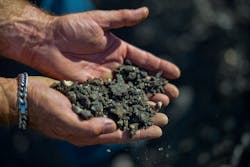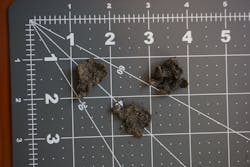ENVIRONMENTAL STEWARDSHIP BACKGROUND:
As part of the Federal Highway Administration’s (FHWA) recycled materials policy, the FHWA actively promotes asphalt pavement recycling and technology and recognizes that using recycled asphalt pavement (RAP) can have the greatest economic, environmental, and engineering impact in pavement recycling. Learn more about the FHWA’s recycled materials policy and stance on RAP.
PROBLEM:
When RAP is processed for reuse, it is first placed into a crusher and then sent through a screening process to remove large pieces. In some cases, traditional paving fabrics have been difficult to process due to large fabric pieces clogging the scalping screen. It is not uncommon for large pieces of paving fabric to slow down, or even shut down, the screening process. The loss of efficiency is one reason some recyclers have started charging a premium for processing RAP with traditional paving fabric, and other recyclers have refused to process it all together.
SOLUTION:
Petromat Enviro was developed to solve the milling and recycling issues associated with traditional paving fabric. This new, patent-pending paving fabric is engineered to easily mill into small pieces so it can be recycled into RAP without compromising its ability to provide moisture protection or stress absorption to slow fatigue and reflective cracking. Glass-based geosynthetic interlayers were also introduced in response to challenges of milling traditional paving fabrics. Because of their brittle nature, fiberglass strands do mill and recycle easily. However, this same property inhibits them from stretching, which can lead to breaks in the fabric during installation or when placed on a milled surface, creating a less effective moisture barrier and impeding the ability to absorb stress. Petromat Enviro features optimal elongation, allowing it to be placed directly on a milled surface without fear of breaking. This flexible design also allows for smooth, wrinkle free installation, even around curves.
RESULTS:
Following a successful milling of an asphalt road using PETROMAT Enviro, the reclaimed asphalt pavement was crushed and screened at a processing facility in Marysville, CA. Prior to processing, the Petromat Enviro was nearly indistinguishable, one inch or smaller. Petromat Enviro was easily screened with no slow-down in processing efficiencies.
Editor's Note: Scranton Gillette Communications and the SGC Infrastructure Group are not liable for the accuracy, efficacy and validity of the claims made in this piece. The views expressed in this content do not reflect the position of the Roads & Bridges' Editorial Team.

